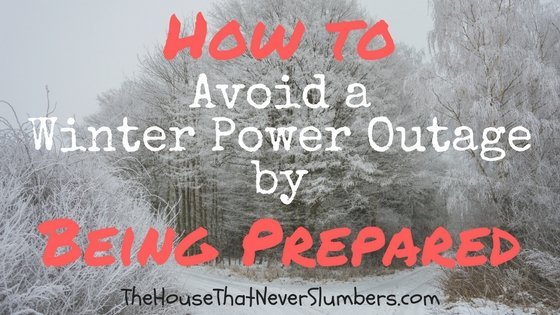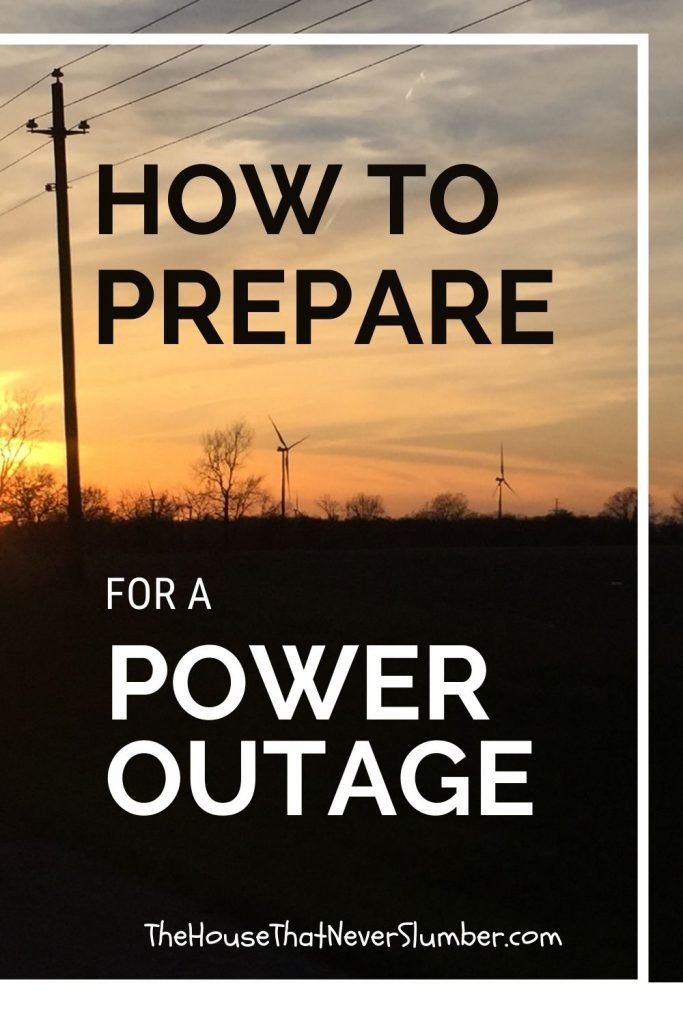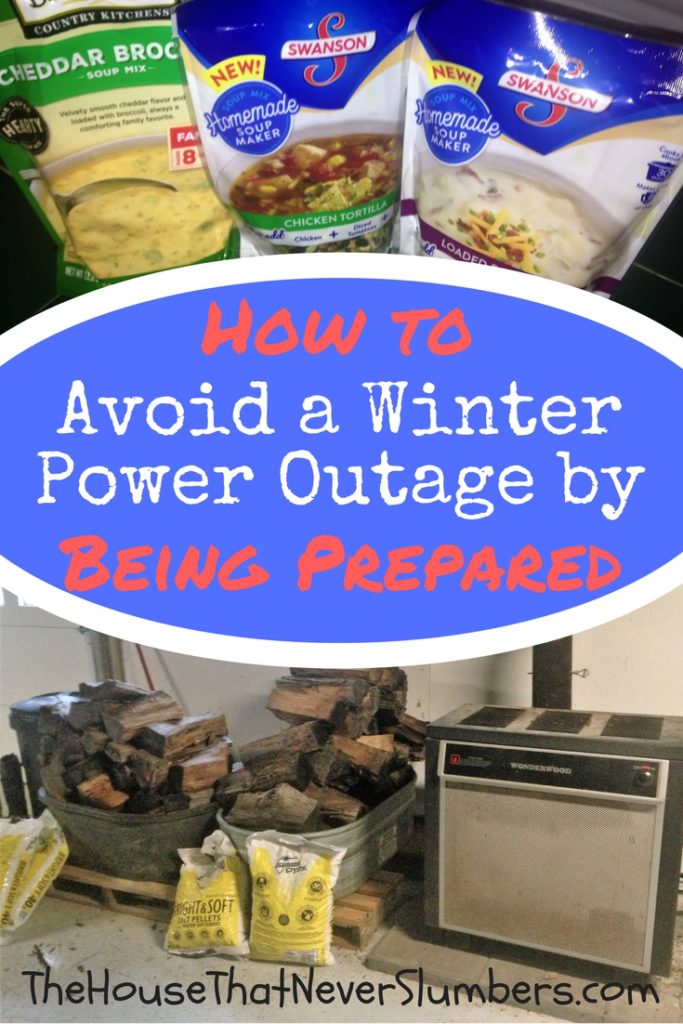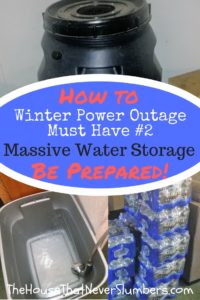
I know you’re all wondering how I can possibly avoid a winter power outage. I obviously have no control over the electric power service. I certainly don’t have a magic weather machine to control the winter weather. However, I can assure you I have successfully avoided winter power outages for more than a decade. It took me a few years, but I have discovered the secret to preventing winter power outages.
*This post contains affiliate links.
A Few Rough Winters
We built this house in 2001, and I’ve always had big dreams of making the basement fully operational even when the power grid is completely down. During my childhood, winter power outages were not uncommon. Indiana winters can be brutal. Our power was out for several, long days during my senior year. We had another lengthy power outage while I was in college. So even before building this house, there were certain features I knew I would eventually want even if we couldn’t afford them right away.
During the first few years of living here, the basement was completely bare and empty. During that time, guess what? We had multiple winter power outages lasting days at a time. During one of those, we all stayed next door in my parents’ basement because they have an alternative heating source, and they own a generator that can run a TV and some lighting. We had very small children then, and keeping a baby warm is not easy in a grid down situation. During an even longer power outage, we all (including my parents) ended up at my sisters’ house. During that outage, the roads were clear enough that we could make it to town after the first day, but it was still almost two weeks before our power was restored.
During that last outage, our neighbors to the east had power again after about five days. Our neighbors to the north regained power after 6-7 days. My grandparents to the west had power after eight days. For two more days, after everyone else on every side had power, we did not. Only our house and my parents’ house remained as a lonely, dark island of no power.
After three or four nights at my sisters’, we returned to our houses even though our power wasn’t restored because we were running out of clothes there, and we were just so frustrated. Once the neighbors were getting power again, we thought our power would surely come back any minute, so we would just wait it out at home. Every morning I would wake up and want to cry. Every night I would look around at the houses on every side with their security lights and want to cry. We called the power company every day. Every day they said we had to be patient because not everyone had been restored.
Finally, one morning we called again. That time they assured us everyone had been restored. We assured them we HAD NOT been restored. Oops. There was a tiny little switch on the pole between my house and my parents’ that hadn’t been reset. A power truck drove out. The man got out and took a really long telescoping pole and flipped that switch. It took him about 30 seconds. Then we had power! We could have had power several days before that if that switch had been flipped. We didn’t have time to be mad about it because we were just so happy to have power again.
That ten-day power outage perhaps gave us the motivation we needed to get more serious. We started slowly adding stuff to our own basement in hopes of having somewhat comfortable living arrangements during a long-term power outage.
A generator is not a necessity in surviving a winter power outage. I know it’s nice to have one, but it’s not essential to survival. Instead of sinking financial resources into a generator, we decided to focus first on the three winter preparedness features that are actually necessary, not just convenient.
1.) Alternative Heat for a Power Outage
Although we heat the upstairs with propane, the furnace runs on electric. We installed alternative heat in the basement first. We needed some form of heating in the basement anyway, so we made sure to invest in sources that would work without any form of electric power. Check out Winter Storm Preparedness – Alternative Heat without Electricity.
2.) Massive Water Storage for an Emergency
We have quite a bit of water accessible at all times. During winter, I like to have an additional 50 gallons of water that would be usable for washing but not ready for drinking without boiling. We also try to keep several cases of bottled water stocked. My storage solution for the 50 gallons is one of my most ingenious ideas ever. Check out Winter Storm Preparedness – Massive Water Storage on the Cheap to find out about my water storage system.
3.) Non-Perishable, Easily-Prepared Food for When You Have No Electricity
We have plenty of food in the house at all times. Starvation would not be a factor even if we weren’t specifically prepared for winter outages. We always have a freezer full of beef, venison, and pork. We have cabinets full of dry goods, canned goods, and so on. We have a grill outside, and we have been known to cook on it in winter even when the power’s not out. We would not starve even with no specific food preparation, but trying to feed a large family with no electric power source can be a lot simpler with some pre-planning. Don’t miss my food guide Winter Storm Preparedness – Power Outage Foods.
Pin this!

My emergency preparedness worked but not in the way I had anticipated.
With some time and effort and a relatively modest amount of investment, we were able to accommodate these three essential winter storm necessities over a decade ago. However, we have not experienced any power outages more than a few hours long since I’ve implemented my winter preparedness tactics. Therefore, I can only conclude the act of being prepared has caused the power to stay operational. I have completely avoided a winter power outage simply by getting ready for one.
All the years that I scoffed at the weatherman and convinced myself it was just a bunch of hype, and I didn’t even rush out to buy milk and bread, we suffered massive ice storms that took out the power of thousands of people. Every time I could hear the ice crackling on my roof as I was dozing off to sleep and thought maybe I should get out of bed and fill a tub of water or something, I woke to no power. Ever since I’ve been prepared for a lengthy experiment in primitive living, the power has stayed. Those of you who are local and reading this can thank me for keeping all our power on just by investing in and implementing winter preparation measures. You’re welcome!
Trust me. I’m not complaining. I’ll gladly keep the electricity. I feel no special need to put my preparedness plan to the test. I will gladly absorb that waste of time, effort, and money.
Current Predictions on this Winter Storm?
I can only assume that you could benefit from winter preparedness in a similar way. If you prepare for the winter power outage, it surely won’t happen, right? So far, my track record is 100%. The forecasts are calling for anywhere from 2-22 inches for us this weekend. Some of the predictions include ice. Will I make it through the Blizzard of 2018 with my perfect record unscathed? Will we maintain power throughout the entire ordeal? Let us know your predictions in the comments!
Don’t let your friends be unprepared! We appreciate likes, shares, pins, tweets, and follows. Subscribe to The House That Never Slumbers using the form.
Pin this!

*This post contains affiliate links.





My local recycling center sells five gallon buckets with lids for a buck. I have two in the bottom of my linen closet for emergencies filled with water. I also have one of those bucket openers to pry off the lid.
My town, the water mains are ancient and prone to breaks.
My alternative heat source is a kerosene heater. Bought it on Facebook marketplace for fifty bucks and it was unused and still in the original box. If the power goes out, I can shut off the part of the house without plumbing and put everyone in the bedroom next to the bathroom.
I can also put a pan of water on top of the kerosene heater to warm it up and help humidify the house. On the floor next to the kerosene heater, I park some stockpots of water and the heat radiating warms those too.
Cooking can be done on the gas grill.
You have a great plan in place! So many people have no emergency plan at all. The situation in Texas this winter was just devastating because no one in those areas expected freezing temperatures.
How about some tips for apartment dwellers? Everything is electric except for the heat, which is baseboard (oil). Not allowed to have freezer, generator, or grill.
Oh, wow. That would be tricky. I don’t feel like I’m qualified to write that post because I’ve never lived in an apartment, but maybe I could find someone to guest post who has more experience. I do have this post that I wrote after being evacuated from a condo in Florida for a hurricane during a vacation. It focuses more on foods that don’t need refrigeration.
https://thehousethatneverslumbers.com/10-emergency-foods-you-must-stock-for-a-power-outage-situation/
Google “Winter camping” for ideas on surviving in the cold. My sister was without heat for a week, but lucky to have a small fireplace. Unfortunately some fireplaces send much of your homes heat up the chimney. She set up her tent in the living room to conserve heat. People camp in the snow all the time – but they go prepared. In an apartment you probably won’t lose water but I would fill the bathtub for flushing the toilet just in case. Also fill pitchers and pots for drinking water. Cover your windows and any outside doors to minimize heat loss. A small propane stove for cooking OUTSIDE, always outside!! can help you stay warm on the inside by providing you with warm meals. There are tons of camping stoves of differing sizes. You are not trying to heat your whole apartment at this point, just yourselves. A tent and sleeping bags or using blankets or a tarp inside to create a tent will help. Run in place or do jumping jacks to warm up before crawling into your sleeping bag. Remember to eat high dense calorie foods that your body can turn into energy. You can utilize a hay box for cooking all day like a crock pot instead of using your small cook stove for hours. Here are two links to YouTube videos explaining how a hay box works. The second one has a hay box made from a cooler and blankets, things most of us have around the house.
https://m.youtube.com/watch?v=FGLFeYNr2w0
https://m.youtube.com/watch?v=8hm7IVGjVVA
You can also check Amazon for “thermal cooking” or “Wonderbag”.
Just a few ideas. Most of the time the cost of being prepared is directly proportional to the level of being prepared. Good Luck!
These are all amazing off-grid suggestions! Thanks for the valuable input on power outage survival in an apartment. I only have personal experience with no electrical power in a rural home, but I’m glad there are others with knowledge of urban survival.